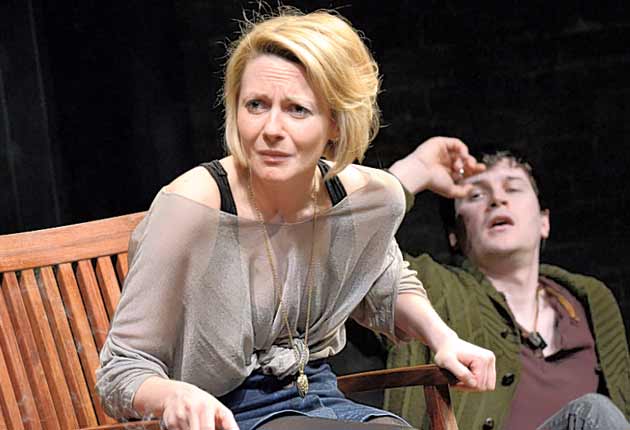The Knot of the Heart, Almeida Theatre, London
Won over by a woman on the edge

There's an almost site-specific dimension to this Almeida premiere of The Knot of the Heart, David Eldridge's searching and scrupulous new play about the fall and rocky, gruelling rehab of a twentysomething middle-class heroin addict and media wannabe.
It's not just that, festooned with thick, immemorial ivy, the Almeida's famous brick walls form a natural backdrop to the garden of the moneyed Islington home where, at the start of the play, the glamorous Lucy, a children's TV presenter, smokes smack and confesses to her mother that her habit has been rumbled and that she's been suspended from work. Indeed, as a cautionary adjunct to the play, the theatre could run tours to, say, nearby Clissold Park, where Lucy prostitutes herself, or to the very cafe on Upper Street where she sometimes buys her dealer one of their meringues. The message is clear: being born into a middle-class stronghold grants no one immunity from the degradations of drug abuse.
Eldridge created the role of Lucy for Lisa Dillon and she repays the debt with a shatteringly brilliant and unsparing performance. She brings the script's insights to harrowing, unsentimental life as she shows how this poor little rich girl struggles to defend herself against the truth of her plight with shrill petulant snobberies ("How dare you call me a junkie") and how, by abdicating all responsibility in the illusory highs of a fix, Lucy contrives to retain a tyrannous, manipulative hold over her loved ones.
In Michael Attenborough's attentive, painstaking production, Margot Leicester is magnificent, too, as her long-widowed mother, Barbara and again it's because her portrayal draws attention to what is less than sympathetic in the character. The mother may be in a no-win situation. But is she herself tough enough for the "tough love" that Lucy so evidently needs? Or, by "controlling" the situation through buying and monitoring Lucy's drugs, is she feeding her own habit of dependency on a daughter she had saddled with the need to be brightly perfect? Leicester superbly communicates Barbara's sudden surges of slippery selfishness, particularly in the excellent confrontations with Lucy's older sister, Angela (Abigail Cruttenden). A successful solicitor, this sibling resents having had to play boring, responsible second fiddle and to pretend that, under the steely lid of capability, there were no emotional demons of her own.
Kieran Bew turns in a tour de force of versatility as all the men (ranging from a lovely camp Geordie nurse to a red-top journalist on a sting mission) whom Lucy encounters on her odyssey to and beyond a crisis intervention centre. I couldn't quite believe that the revelations in the second half would not have surfaced earlier in any reputable treatment and to end the play on Table Mountain with Lucy emoting about how, like her, this country is "trying to find a new beginning for itself" seems a bit vague in its uplift, given the dreadful drug problems in post-apartheid South Africa. But, as with all Eldridge's work, the play cuts to the quick emotionally. "I have broken my own heart and I will never be able to mend it," declares Lisa Dillon's transfixingly desolate Lucy. Could grievous, near-suicidal disappointment with oneself be expressed more eloquently?
To 30 April (020 7359 4404)
Subscribe to Independent Premium to bookmark this article
Want to bookmark your favourite articles and stories to read or reference later? Start your Independent Premium subscription today.

Join our commenting forum
Join thought-provoking conversations, follow other Independent readers and see their replies